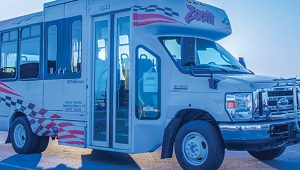
Total Transit evolves virtual Dial-a-Ride service

Total Transit, Phoenix, AZ
Total Transit has been providing transportation services throughout the Southwest for 30 years. I started the business in 1984 by purchasing 15 taxis for airport service. Over the years, we evolved into a full-service transportation company with three lines of business: public, private and transportation management.
Our private transportation division consists of the largest Prius hybrid fleet in North America serviced by the busiest call center in the country. We are able to leverage Arizona’s uniquely deregulated marketplace to foster innovations that result in higher quality customer service. We invest heavily in our infrastructure to support all three lines of business with continuous improvement efforts.
We expanded into transportation management in 2002. We launched in Arizona, expanded into the greater Southwest and are now expanding across the United States. Transportation Management requires setting high standards for your providers, the ability to take calls from anywhere across the country and to fulfill those trip requests in a cost effective manner. Our innovative culture coupled with our proven transportation expertise in Private Transportation and Transportation Management facilitated the development of our unique Virtual Dial-a-Ride (VDAR) offering.
Our VDAR model truly relies on the principles of supply and demand. Most traditional DAR systems are restricted by their capacity; they provide service when the fleet is available. We provide individual on-demand transportation as needed. With traditional DAR, the size of the fleet determines how many rides per hour are provided. With Total Transit’s VDAR model, we create a flexible fleet that utilizes our vehicles and our partners’ fleets to cover as few or as many trips as necessary at any point during the day. If you need two cars at a given time, we provide two cars. If you need 500 cars, we provide 500 cars and you are only billed based on what you need.
Our VDAR model eliminates the need for any public capital investment in vehicles, garages, yards or dispatch centers as well as the corresponding personnel. This results in a decrease in total operating costs. All of our drivers undergo the same background checks, drug tests, ADA and sensitivity training that traditional transit employees are required to undertake. We now have one of the largest accessible vehicle fleets in the country, which improves the lives of not only our VDAR riders but our medical and private clients as well.
 We’ve been a partner with the Regional Public Transit Authority (RPTA) Valley Metro in Phoenix, AZ, since 2008, providing express service, fixed route and circulator services. We implemented our unique VDAR approach in July 2012 with Valley Metro. Valley Metro CEO Steve Banta was aware of some less than perfect examples of using taxis to perform DAR services, but was attracted to Total Transit’s Transportation Management brokerage model. We were awarded the contract and originally only permitted to use our taxi division for 50 percent of the work and were required to subcontract the remainder. This process is leading us to further develop our software and cloud computing abilities. It was easy to give transparency and real time information to Valley Metro from our own fleet, but harder to get a real-time look at our partners. This inability gave us the motivation to pursue the development of our peer-to-peer software so every transport can be seen in real time. This new software will give us the ability to see exactly what every trip’s status is, regardless of the fleet providing the trip. No one else has the technology to put this same program in place at this time. We currently provide our VDAR service in multiple public transit agencies and are looking for more locations interested in this transparent and cost-effective solution.
We’ve been a partner with the Regional Public Transit Authority (RPTA) Valley Metro in Phoenix, AZ, since 2008, providing express service, fixed route and circulator services. We implemented our unique VDAR approach in July 2012 with Valley Metro. Valley Metro CEO Steve Banta was aware of some less than perfect examples of using taxis to perform DAR services, but was attracted to Total Transit’s Transportation Management brokerage model. We were awarded the contract and originally only permitted to use our taxi division for 50 percent of the work and were required to subcontract the remainder. This process is leading us to further develop our software and cloud computing abilities. It was easy to give transparency and real time information to Valley Metro from our own fleet, but harder to get a real-time look at our partners. This inability gave us the motivation to pursue the development of our peer-to-peer software so every transport can be seen in real time. This new software will give us the ability to see exactly what every trip’s status is, regardless of the fleet providing the trip. No one else has the technology to put this same program in place at this time. We currently provide our VDAR service in multiple public transit agencies and are looking for more locations interested in this transparent and cost-effective solution.
Before we took over the DAR operation, Valley Metro was spending over $35 per boarding on their paratransit service, which relied upon on the traditional fleet of cutaway buses dispatched from a facility solely dedicated to the DAR operation. Providing about 220,000 passenger trips, they were spending about $10 million a year on the traditional service. When Total Transit was awarded the contract, the cost per boarding dropped to $23, a savings of 35 percent and millions of dollars.
We’re leveraging technology by making vast investments to further develop and evolve our proprietary peer-to-peer platform. These systems will allow ADA passengers to order a ride through the touch of their smartphone app and give participating municipalities the real-time, dynamic access to data they desire. As a result, we’ll be able to provide a great service that is even more user friendly and convenient for our customers.
